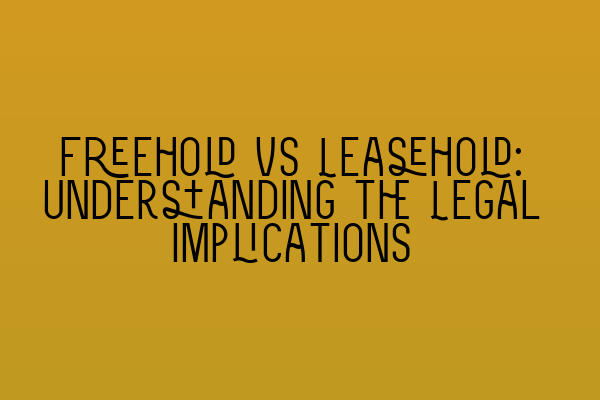Freehold vs Leasehold: Understanding the Legal Implications
When it comes to property ownership, one of the key considerations is whether the property is held as freehold or leasehold. Understanding the legal implications of both types of ownership is vital for potential property buyers and investors. In this blog post, we will explore the differences between freehold and leasehold, the rights and responsibilities associated with each, and the factors to consider when making a property purchase.
Freehold Ownership
Let’s start by looking at freehold ownership. In simple terms, owning a property freehold means that you have outright ownership of both the building and the land it stands on. You have full control, and there is no time limit on your ownership. This is often seen as the most desirable form of ownership for homeowners.
As a freeholder, you have the right to make modifications to the property, such as extending it or renovating it, without seeking permission from anyone. You also have the responsibility for maintaining the property and the land it sits on.
One of the major advantages of freehold ownership is that there are no ground rent or service charges to pay. However, it’s worth noting that as a freeholder, you may have additional responsibilities, such as maintaining shared facilities like driveways or communal spaces in certain developments.
Leasehold Ownership
Now, let’s move on to leasehold ownership. In leasehold ownership, you own the property for a fixed period of time, typically between 99 and 999 years, but the land itself remains owned by the freeholder. This means that as a leaseholder, you have a contract or lease agreement with the freeholder which specifies the rights and responsibilities of both parties.
As a leaseholder, your rights include the right to occupy and use the property for the duration of the lease. However, you may need to obtain permission from the freeholder for certain activities, such as making significant modifications to the property or subletting it.
Leasehold ownership often comes with a ground rent and service charges payable to the freeholder. The ground rent is an annual fee, and the service charges cover the maintenance and management of the building and communal areas. It’s important to note that these charges can vary significantly, so it’s essential to review the terms of the lease carefully.
Leasehold ownership is commonly associated with flats and apartments, where shared spaces and facilities are maintained by the freeholder or a management company. It’s also worth mentioning that leasehold properties can be bought and sold, with the lease being assigned to the new owner.
Factors to Consider
When deciding between freehold and leasehold ownership, several factors should be taken into account. Firstly, consider the length of the lease if you are considering a leasehold property. A longer lease is generally more desirable, as it provides greater security and potentially higher resale value.
It’s also important to consider the ground rent and service charges associated with a leasehold property. These costs can have a significant impact on your budget, especially if they increase over time. Consulting with a solicitor who specializes in property law can help you understand the financial obligations and potential risks involved.
Another factor to consider is the ability to make modifications to the property. As a freeholder, you have greater freedom to make changes to your property without seeking permission. However, as a leaseholder, you may need to obtain consent from the freeholder, which could restrict your ability to personalize the property to your liking.
Understanding the legal implications of freehold and leasehold ownership is crucial when purchasing or investing in a property. By knowing your rights and responsibilities, you can make an informed decision that aligns with your long-term goals.
If you’d like to deepen your understanding of property law or other relevant legal topics, we invite you to explore our related articles:
– Understanding Contractual Capacity: Rights and Limitations
– Interactive SQE Mock Tests for Contract Law: Test Your Knowledge
– Join Our SQE Contract Law Webinars: Expert Insights and Guidance
– Contract Law Reforms: An Analysis of Recent Changes
– Parties in a Contract: Rights and Responsibilities
At SQE Property Law & Land Law, we have a team of experienced solicitors who specialize in property law. Whether you need assistance with a property purchase, lease agreement, or any other property law matter, our experts are here to provide you with reliable advice and guidance.
Don’t hesitate to contact us today to discuss your property law needs.
